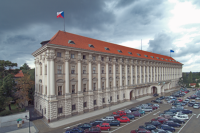Information about the Czech Republic
The Czech Republic (Czech: Česká republika, short form in Czech: Česko), also known as Czechia, is a landlocked country in Central Europe. The country borders Poland to the northeast, Germany to the west, Austria to the south, and Slovakia to the east. The capital and largest city is Prague (Czech: Praha). The country is composed of the historic regions of Bohemia and Moravia, as well as parts of Silesia. The Czech Republic is a member of NATO (since 1999); and the European Union (since 2004).
Location
Central Europe.
Time
GMT + 1 (GMT + 2 from last Sunday in March to last Sunday in October).
Area
78,866 sq km (30,450 sq miles).
Population
10.5 million (2017 estimate).
Population Density
134 per sq km.
Capital
Prague. Population: 1.2 million (2017).
Geography
The Czech Republic is a landlocked country situated in central Europe, sharing frontiers with Germany in the west, Poland in the north, the Slovak Republic in the east and Austria in the south. Covering only about one-third of the area of the United Kingdom, the country is hilly and picturesque.
The western two-thirds of the country is known as Bohemia, and consists of a vast river basin fringed by hills and mountains. The Czech Republic's longest river, the Labe, rises in the Krkonoše Mountains in the northeast, on the border with Poland, and flows south, then west, then north into Germany where it becomes the River Elbe. These mountains are also home to the country's highest summit, Sněžka (1,602m/5,262ft).
Prague sits almost in the middle of Bohemia on the River Vltava, which flows into the Labe just to the north of the city. The Vltava rises in the forested Šumava hills that run along the country's southern border with Austria. The plains to the north of Prague are bordered by the Krušné Hory (Ore Mountains, named for the iron ore and other minerals found there).
The eastern third of the Czech Republic is known as Moravia. This region is also based on a river basin, that of the Morava River, which rises in the northern hills near the Polish border and flows south to join the Danube at Bratislava. The main city of Moravia is Brno, the second-largest in the Czech Republic.
EU
Member since 2004. Member of the Schengen area since 2007.
Government
Republic since 1993.
Head of State
President
Head of Government
Prime Minister
Recent History
The Czech Republic is one of Europe's youngest states, having come into existence only in 1993. Before that, it had formed the western part of Czechoslovakia, a country which itself had been created in 1918.
Czechoslovakia threw out its communist regime, which had been in power since 1948, in the Velvet Revolution of 1989 - so called because it took place without any violence. The dissident playwright Václav Havel became President and served until 2003 (from 1993 to 2003 as the Czech President). In 1993, Czechoslovakia split into two independent republics - the Czech Republic and the Slovak Republic.
Language
The official language is Czech.
Currency
Czech Koruna/Česká koruna (CZK)
Religion
Mostly Roman Catholic and some Protestant, including churches such as the Reformed, Lutheran, Methodist, Unity of Czech Brothers and Baptist. There is a small community of Jews, mainly in Prague. According to the March 2011 national census, 79 % of the population profess no religious beliefs.
Electricity
Generally 220 volts AC, 50Hz. Most major hotels have standard international two-pin razor plugs.

